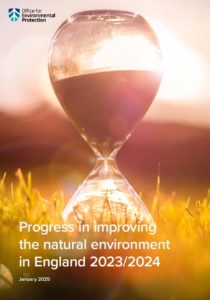The Office for Environmental Protection (OEP) believes this Government has the chance to get on track to meet legal environmental commitments – but warns that the window of opportunity is closing fast.
 In its latest annual assessment, ‘Progress in improving the natural environment in England 2023/2024‘, the OEP has found that progress towards improving the environment has slowed, with government still largely off track in achieving its legal environmental commitments.
In its latest annual assessment, ‘Progress in improving the natural environment in England 2023/2024‘, the OEP has found that progress towards improving the environment has slowed, with government still largely off track in achieving its legal environmental commitments.
The OEP report, published 16th January 2025, provides an assessment of progress towards legally-binding environment targets, commitments and goals (including those in the statutory Environmental Improvement Plan (EIP)) such as obligations to halt declines in water, air quality and nature.
The report covers the period 1 April 2023 to 31 March 2024, and can be found here.
The OEP concludes that while there have been some areas of improvement, very substantial challenges remain with less progress being made overall compared to the previous 12 months. Government is still largely off track to achieve obligations endorsed by Parliament to significantly improve the natural environment.
Key deadlines are fast approaching. There is still opportunity for this government to catch up and to get on track, and to change the trajectory we are on. To do so, urgent and decisive action is needed, says the OEP.
The report also warns that unless things change materially, key targets, such as the 30 by 30 target on land and sea will not be met.
Dame Glenys Stacey, the OEP’s Chair, said:

“Once again, our annual EIP progress report is a worrying read. Due to the reporting cycle, it assesses the progress made under the previous government, but our recommendations and advice still very much apply to the current government as it must deal with mounting environmental challenges.
“However, prospects are not fixed. There are opportunities for this government to get on track.
“But with each passing month, the window of opportunity to redress environmental harms is closing, while the effort needed and cost to do so increases.
“This government must act urgently and decisively to catch up, if it is to meet its legal obligations. Catch up not just by developing plans, but then by fully and effectively implementing them. It has several legally-binding commitments only a few years away. The window of opportunity is closing fast.”
Dame Glenys welcomed the Government’s recent decision to carry out a rapid review of the EIP.
“The new EIP must show real intent, and focus. It needs to front load efforts to catch up and to set out clearly to all, what has to be done, by whom and by when. Statutory environmental targets were agreed by Parliament, knowing how urgent and compelling the situation is. The new EIP must go beyond existing policies and actions, with realistic and determined delivery plans to make achieving these imperative targets and commitments a reality.
“We have given advice to assist with the EIP review and we now await the new version with great interest. The Government must get that plan right and then deliver it effectively and at pace.”
The OEP progress report makes eight key recommendations for action that will deliver benefits across EIP goals and the Government’s five environmental priorities:
- Get nature-friendly farming right with greater government engagement with farmers and landowners being key to improving the environment at scale
- Maximise the contribution of protected sites for nature by enhancing and enforcing their legal protection and urgently correct underinvestment in site designation
- Speed up action in the marine environment by delivering on overdue Marine Protected Area bylaws and by implementing a new UK Marine Strategy
- Set out clear mechanisms for reconciling competing demands for use of land and sea by progressing Local Nature Recovery Strategies, a Land Use Framework and put in place detailed catchment and marine spatial plans with appropriate resources
- Develop a circular economy framework by updating the Resources and Waste Strategy and accelerating a new UK policy and regulatory framework for chemicals
- Mobilise investment at the scale needed by providing strong incentives, oversight and regulation to attract private investment and support local authorities to build and maintain the capacity needed to mobilise investment
- Regulate more effectively by providing sufficient resources, building capacity, improving engagement with businesses and the public as well as coordination between relevant authorities
- Harness the support needed to achieve ambitions by showing leadership at the highest level across government departments and directly linking the Environmental Principles Policy Statement to statutory targets and delivery plans, as well as the revised EIP being more transparent and better communicated
The OEP’s assessment of the prospects of meeting 43 environmental targets and commitments found that government is largely on track to achieve 9, partially on track to achieve 12 and largely off track to achieve 20.
Targets where government is largely on track include specific air pollutants such as PM2.5, and particular sources of water pollution such as phosphorus loadings from wastewater. Targets where government is largely off track span most EIP goal areas including those for nature, freshwater and marine environments and waste.
In terms of the overall prospects of government meeting its ambitions for significantly improving the natural environment, the OEP concludes that in seven goal areas, including the apex goal of achieving ‘thriving plants and wildlife’, government is largely off track. In three goal areas, government is partially on track (‘clean air,’ ‘reducing the risk of harm from environmental hazards’ and ‘enhancing beauty, heritage and engagement with the natural environment’).
Most progress has been made on reducing some environmental pressures – such as emissions of some air pollutants, greenhouse gases and chemical pollutants. Although there are signs that the downward trend in species abundance is slowing, wider biodiversity trends continue to get worse as does the marine environment.



